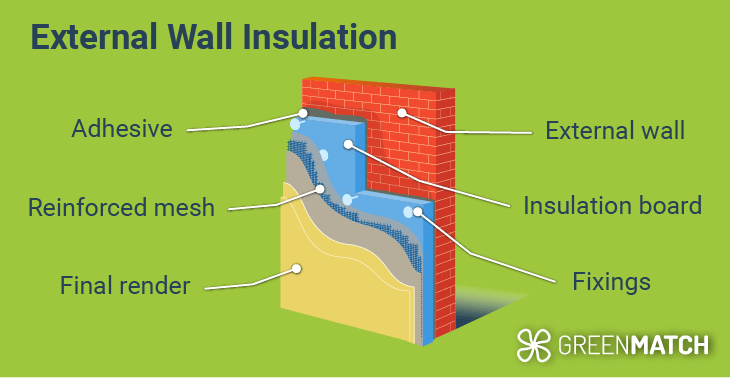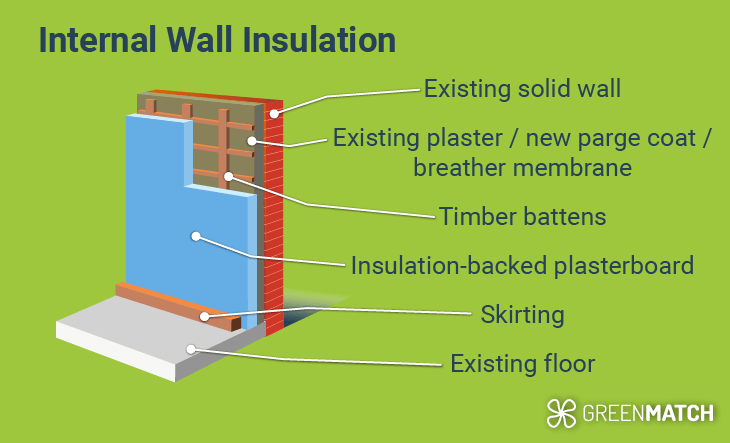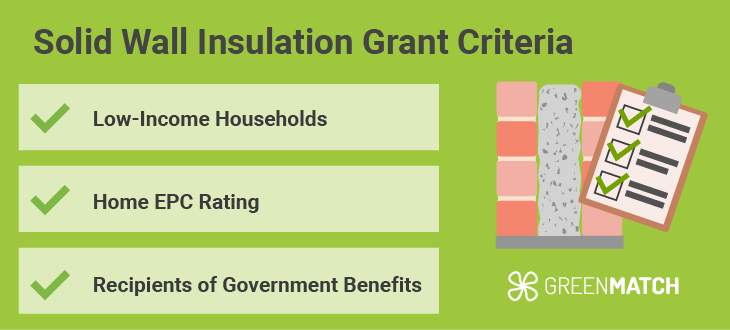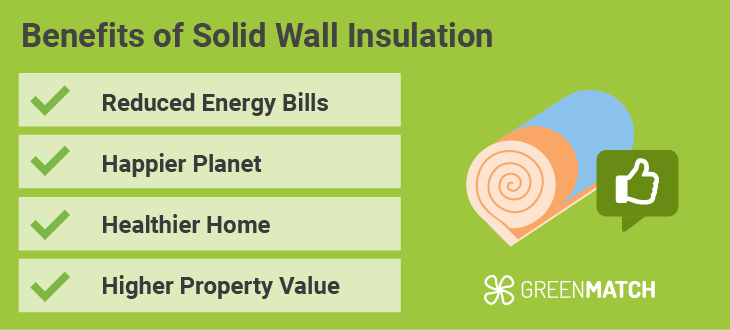Answer these simple questions and we will find you the BEST prices
Which type of solar quotes do you need?
It only takes 30 seconds
100% free with no obligation

Get Free quotes from insulation specialists near you

Save money by comparing quotes and choosing the most competitive offer

The service is 100% free and with no obligation
- GreenMatch
- Insulation
- Insulation Grants
- Wall Insulation Grants
- Solid Wall Insulation Grants
Solid Wall Insulation Grants: A UK Guide

- Solid wall insulation for a semi-detached home costs around £7,500 for internal walls, and around £12,000 for external wall insulation.
- The Great British Insulation Scheme (GBIS) and the Energy Company Obligation (ECO4) both provide free solid wall insulation through grants.
- Both grant schemes are active until March 2026.
Homes with uninsulated walls experience some of the highest heat loss of up to 33%, more so in solid wall properties. The UK government's Department for Energy & Net Zero predicts that there are up to 7.7 million uninsulated solid wall properties throughout the country, leading to soaring energy bills, uncomfortable home environments, and a detrimental carbon footprint. test addition
Luckily, there are two key grant schemes in place to support low-income and fuel-poor houses with insulation measures. These schemes are the Great British Insulation Scheme (GBIS) and the Energy Company Obligation (ECO4), allowing qualifiers to receive free solid wall insulation, or large cost reductions as a result.
This complete guide by GreenMatch UK provides all the essentials for securing a solid wall insulation grant, including eligibility criteria, provisions, and how to apply.
Ready to insulate your solid walls? Let GreenMatch UK be your one-stop solution to landing the best installer bargains. Instead of spending endless hours surfing the web and arranging phone calls, just spend 30 seconds filling out our simple online form to receive up to 3 free home-tailored quotes from our network of trusted installers. Click below to begin!
- Describe your needs
- Get free quotes
- Choose the best offer
It only takes 30 seconds



What are solid wall insulation grants?
Solid wall insulation grants are provided through government-backed grant schemes in the UK to help improve the energy efficiency of the UK housing stock. In line with the country's goal to reach Net Zero by 2050, these grants assist low-income, fuel-poor and energy-inefficient housing with insulation upgrades.
The two current schemes providing solid wall insulation are the Great British Insulation Scheme (GBIS) and the Energy Company Obligation (ECO4). Households that meet the qualification criteria for either scheme can get free solid wall insulation or a large coverage of the costs.
Unlike the cavity wall counterparts, solid walls are made of just a single bricklayer with no cavity space in between. That’s why solid walls can only be insulated externally or internally. Each option has a different installation, pros, and cons to consider.
External wall insulation

External wall insulation is the process of securing insulation material - most often rigid (sheet) insulation - onto the outer walls of your home, then covering it with render (plaster) and cladding insulation.
This is a relatively non-invasive insulation method that leaves the inside of your home intact but can cost up to £12,000 for a standard semi-detached UK home. Additionally, installers sometimes do not account for scaffolding costs, which can cost an extra £300 or more to hire. An external wall insulation grant can make these costs more feasible.
Like any home insulation method, there are several pros and cons worth considering...
- External wall insulation is non-invasive as it does not take place inside your home.
- The process helps fill cracks and gaps in your walls, reducing draught and increasing the lifespan of your brickwork by covering it up.
- External insulation helps reduce inner wall condensation and dampness.
- Cladding enables you to redesign the appearance of your home in any style you want.
- External wall insulation is notoriously expensive.
- Being a complex process, you likely require planning permission to carry it out.
- Gaps that are improperly sealed, especially around window and door frames could create ‘cold bridges’. These are weak spots where your insulation can get damaged.
- Rigid insulation commonly used for external walls is not very eco-friendly, but luckily, sustainable alternatives like corkboard are becoming commonplace.
Internal wall insulation

Internal wall insulation is done by fitting rigid (sheet) insulation onto the inside walls of your home and covering it up with plasterboard, or by building stud walls and filling them with mineral wool or another wall insulation roll like fibreglass or sheep wool. Internal wall insulation grants exist in the UK.
The cost of insulation is around £7,500 for a semi-detached home, and takes place on the inside of the home through two different methods:
- Dry lining is when insulation material like rigid boards is secured directly onto your walls and then covered with plasterboard.
- Alternatively, stud walls can be built to create a panel gap from your existing walls, which are then filled with insulation material like mineral wool.
While costing far less than external wall insulation, there are several pros and cons worth considering with this insulation method:
- Internal insulation is a cheaper solid wall insulation method.
- Due to taking place inside your home, your outer brickwork remains unchanged.
- Internal insulation can provide an added layer of soundproofing to your home.
- It is a notoriously invasive process. As it takes place inside your home, it will disrupt your living environment until the job is done.
- Stud walls will slightly reduce your inner floor space.
- The process requires emptying rooms, and removing door frames, skirting boards, and other wall protrusions until the job is done.
Grants for free solid wall insulation
Currently, two main grant schemes in the UK provide qualifying households with grants for wall insulation. These are the Great British Insulation Scheme (GBIS), and the Energy Company Obligation (ECO4).
Each scheme has a different set of provisions, implementation methods, and conditions worth considering when choosing which scheme to apply for.
Great British Insulation Scheme
The GBIS scheme provides each qualifying household with a single insulation measure based on their personal needs. This helps the scheme increase its reach across the UK.
The most effective insulation measure is determined after a retrofit assessment of your home to identify the best method to increase energy efficiency. The GBIS scheme can be applied directly through an online form on the official UK government website.
Energy Company Obligation (ECO4)
The ECO4 scheme works differently, as it takes a more whole-house approach to improving your energy efficiency. This scheme obliges your energy provider to make a range of efficiency upgrades available to you, including free insulation, but also energy system upgrades, repairs, smart controls and more.
The ECO4 scheme can be applied through your energy provider. Contact them for more information and how to apply for a grant.
Who is eligible for a solid wall insulation grant?

To receive free or reduced-cost solid wall insulation in the UK, you must first meet the qualification criteria of your chosen grant scheme.
The eligibility criteria for both the GBIS and the ECO4 schemes are generally similar but may differ slightly based on whether you are a homeowner or a renting tenant.
Grant schemes in the UK do not cover DIY installations! To benefit from a grant scheme, you must work with a professional accredited installer. Your chosen installer should be PAS 2030-2035 accredited, as this is a sign of their professionalism.
The Publicly Available Specifications (PAS) are a series of retrofitting standards set by the UK government to ensure installers provide the highest quality insulation jobs.
Low-income households
Grant eligibility often prioritizes low-income households. One indicator of low income is a gross annual income below £31,000.
Additionally, council tax bands, which determine property tax based on value, can also reflect income status. In England, homes in bands A - D qualify for grants, while Scotland and Wales extend eligibility to bands A - E.
EPC rating of D or below
An Energy Performance Certificate (EPC) rating measures your home's energy efficiency, with A being the most efficient and G the least. It helps you understand how much energy your home uses and its environmental impact.
To qualify for a solid wall insulation grant as a homeowner, your home's EPC rating typically needs to fall between D and G. The EPC rating requirement is usually stricter for a renting tenant, often needing to be D or E.
Every home must know its EPC rating, especially true for renters. If you don't know your EPC rating, you can contact your landlord, or arrange an inspection through the official UK government portal.
Many insulation installers can also conduct an EPC assessment of your property during their initial consultation.
Recipients of government benefits
Both homeowners and tenants who receive UK government assistance through allowances can qualify for solid wall insulation funding. The current eligible benefits are:
- Income-based Job Seekers Allowance
- Income-related Employment and Support Allowance (ESA)
- Income Support
- Pension Credit
- Guarantee Credit
- Working Tax Credit
- Child Tax Credit
- Universal Credit
- Housing Benefit
Pensioners can still get free solid wall insulation even if they don’t meet the qualification criteria. They must belong to one of two groups; the low-income group, or the general group:
Low-income group
- Homeowners and private renters with a low EPC rating (below E for renters, below D for homeowners).
- Those receiving means-tested benefits (like Pension Credit).
- Those in social housing facing cold weather challenges can qualify, as long as their annual income is below £31,000.
General group
- Homeowners in council tax bands A-D (England) or A-E (Scotland & Wales) with a home EPC rating of D or below can also apply.
If you are unsure whether you meet the qualifying criteria for a grant scheme, you can use the handy tool on the UK government website to check your eligibility. Alternatively for the ECO4 scheme, you can contact your energy provider to learn more.
Benefits of free solid wall insulation

Any kind of wall insulation measure is perhaps the wisest home efficiency investment you could make. By cutting over one-third of your home's heat loss, you can experience a wealth of benefits. Here are just some to consider:
- Reduced energy bills: The soaring bills you receive each month are likely due to your heating system constantly trying to top up lost heat. Proper wall insulation reduces how often your heating system needs to work, saving you up to £280 - £380 on annual energy bills in a 3-bedroom semi-detached UK home.
- Happier planet: The UK housing stock emits more CO2 than all of the cars in the country combined! Insulating your walls means your heating system doesn’t need to work as much to regulate temperature, reducing your carbon footprint by up to 0.9 tonnes.
- Healthier home: Draughty uninsulated homes are a breeding ground for dampness, mould and structural damage. Alongside harming your investment in the long run and racking hefty repair bills, the cold and damp environment will negatively impact your health, increasing respiratory illnesses and susceptibility to flu.
- Higher property value: Insulating your walls will bump up your Energy Performance Certificate (EPC) rating, making your home much more valuable and attractive on the market should you ever plan to rent or sell it.
If that isn’t convincing enough, solid wall insulation boasts some impressive annual savings for every type of home. Here’s how much you could expect to save on your energy bills:
| Type of property | Annual energy bill savings (£) |
|---|---|
| Flat/Apartment | £150 |
| Mid-terrace home | £185 |
| Detached bungalow | £240 |
| Semi-detached home | £315 |
| Detached home | £550 |
With all things considered, solid wall insulation is an absolute game changer for home energy efficiency, saving you money, helping the planet, and improving your home all with just one investment.
The application process for solid wall insulation grants

Grants for solid wall insulation are available until March 2026 through the GBIS or ECO4 schemes. It’s recommended to apply sooner than later so that you have the greatest chance of benefitting.
The application process for solid wall insulation grants is relatively straightforward. Here’s what to expect:
- Check your eligibility
Once you’ve chosen the grant scheme you’d like to apply for, ensure you meet the outlined qualification criteria. You can use this guide, or visit the UK government website for their handy tool to check your general eligibility for a scheme.
- Apply for the grant
If you’re applying to the Great British Insulation Scheme (GBIS), visit the official UK government website and fill out the online application form to apply. From there, you will be contacted by a scheme representative to discuss the next steps and arrange a property assessment. For the ECO4 scheme, contact your energy provider to start the process.
- Find a certified installer
For grant schemes, it’s required to work with a professional installer who meets the government-set standards. You’ll need an installer that is PAS 2030-2035 accredited. This will also ensure that you receive a high-quality job that will live up to its lifespan.
- Get multiple quotes
Don't accept the first quote price you get! There’s a whole market of installers out there. For a full picture, get quotes from several PAS 2030-2035 certified installers. That way, you maximise your chances of landing the best deal for your home insulation job.
Get multiple quotes
While straightforward, finding a great bargain is sometimes like looking for a needle in a haystack. Prospective customers can end up spending endless hours scouring the web and arranging phone calls, with no real bargain in sight. That’s where GreenMatch UK comes in.
Through our nationwide network of trusted professional installers, you can find just what you’re looking for in just a few clicks. Simply spend 30 seconds filling out our online form, and receive up to 3 free home-tailored quotes at competitive prices. The best part? Our services are completely free and without obligations. Click below to begin!
- Describe your needs
- Get free quotes
- Choose the best offer
It only takes 30 seconds



FAQ
You can get a grant for solid wall insulation if you meet the eligibility criteria of your chosen grant scheme. Generally, the criteria are quite the same for the GBIS and ECO4 schemes, and question your income, home EPC rating, and whether you are a recipient of government benefits.
Solid wall insulation is a highly effective energy efficiency upgrade to your home. It can help cut your home’s heat loss by up to 33%, leading to huge energy bill savings, carbon footprint cuts, and an increase in your property value amongst many other perks.
Both the Great British Insulation Scheme (GBIS) and the Energy Company Obligation (ECO4) provide insulation for solid stone walls. To apply for the GBIS scheme, visit the official website of the UK government and fill out the application form. For the ECO4, contact your energy provider directly to get the process started.

Akif is a copywriter at GreenMatch since 2023. With a keen interest in community sustainability, green solutions and the role of digital media in identifying climate trends, he aims to hone in on his background in International Studies and Digital Media to provide a multidisciplinary approach to written content rooted in credible research and accuracy.
We strive to connect our customers with the right product and supplier. Would you like to be part of GreenMatch?

